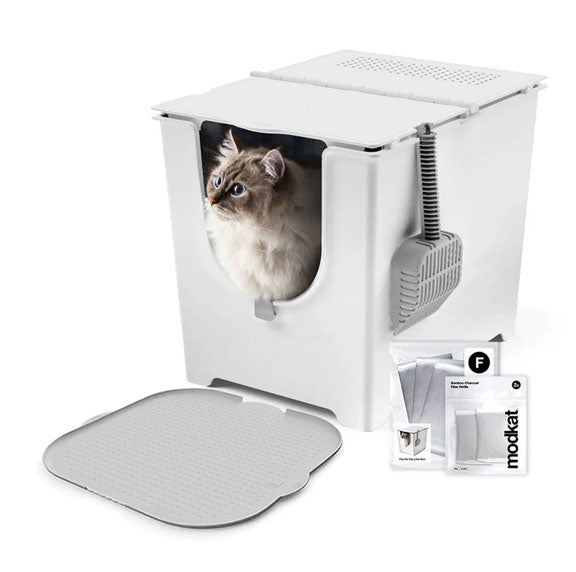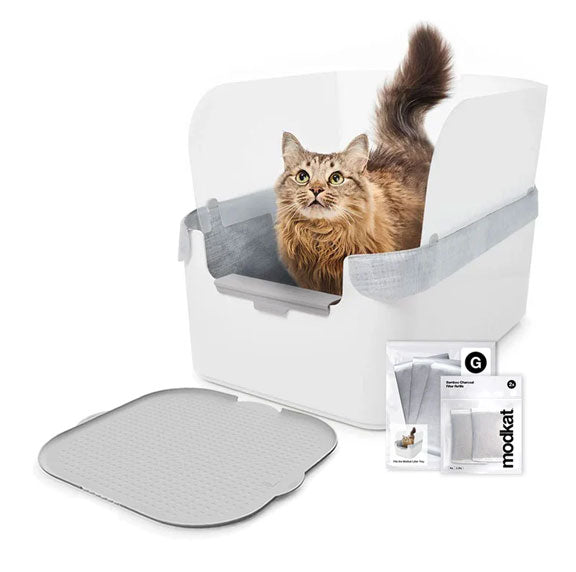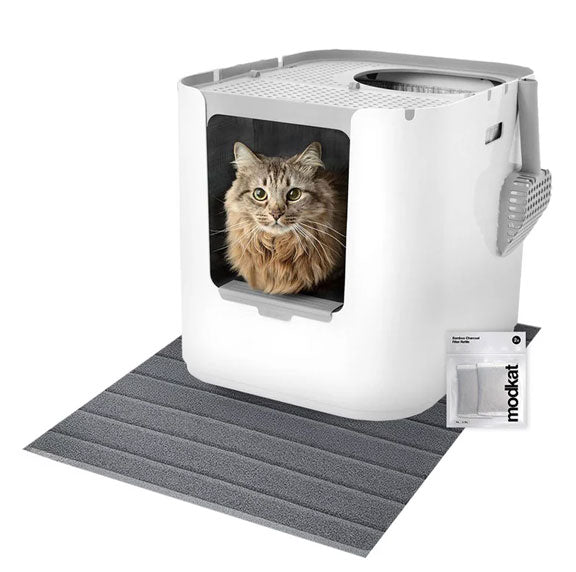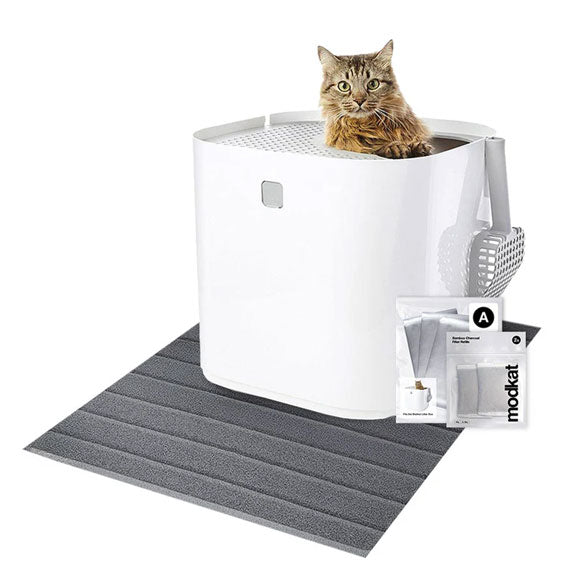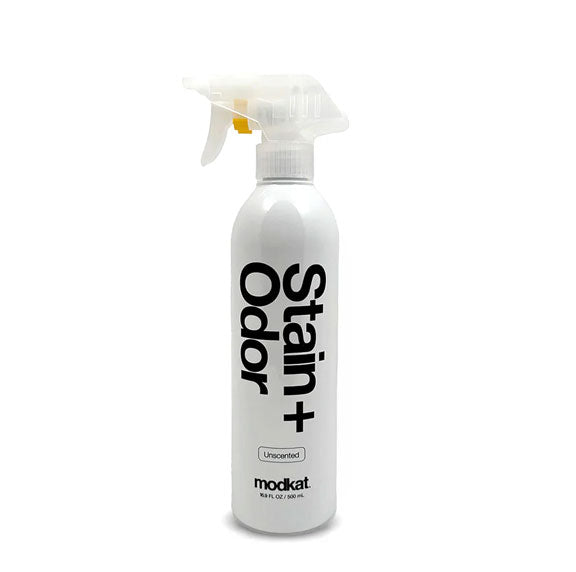Litter Boxes
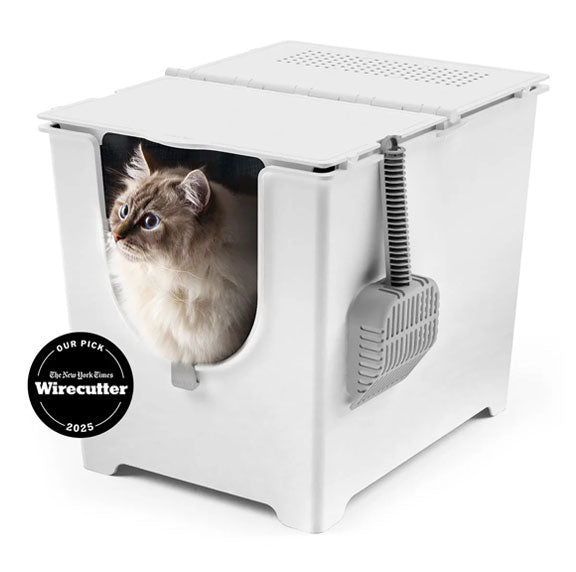
Modkat Flip
Front-Entry Litter Box
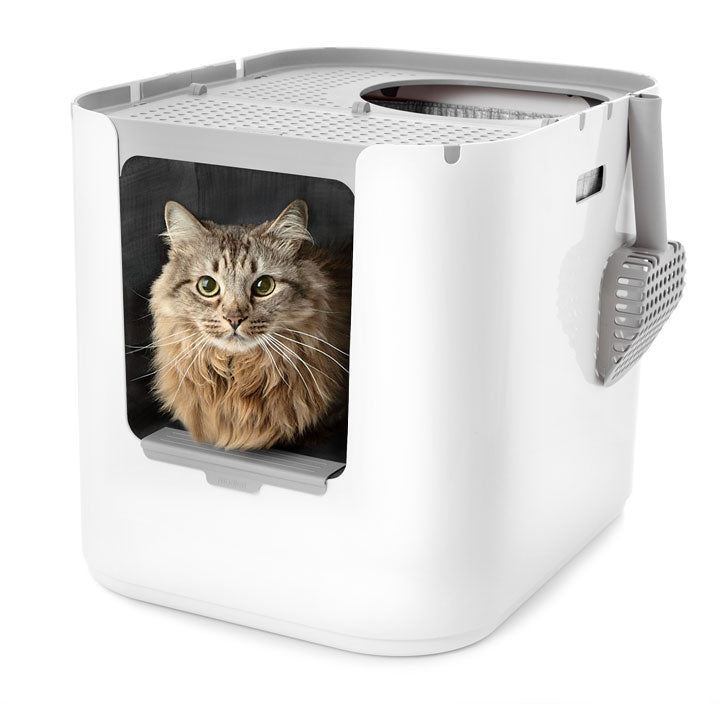
Modkat XL
Front/Top-Entry Litter Box
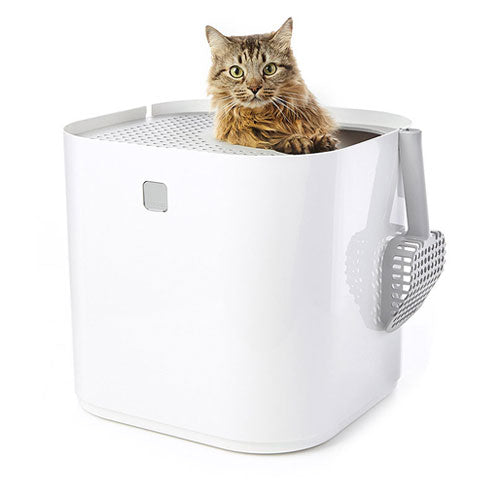
Modkat
Top-Entry Litter Box
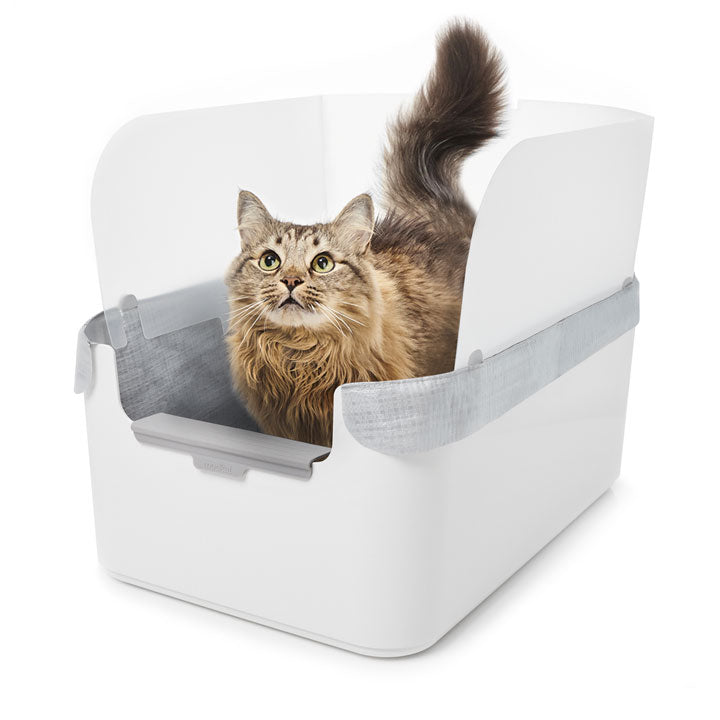
Modkat Tray
Open Litter Box
Starter Kits
Essentials
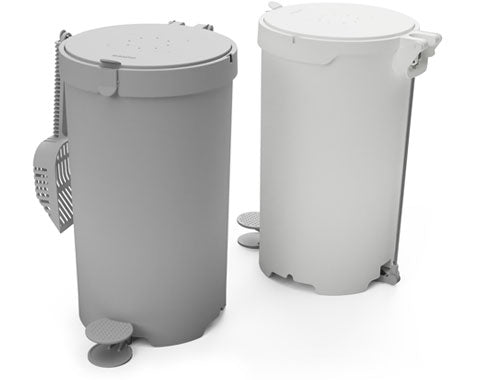
Litter Keeper
Two colors

Litter Mats
Multiple styles, colors & sizes
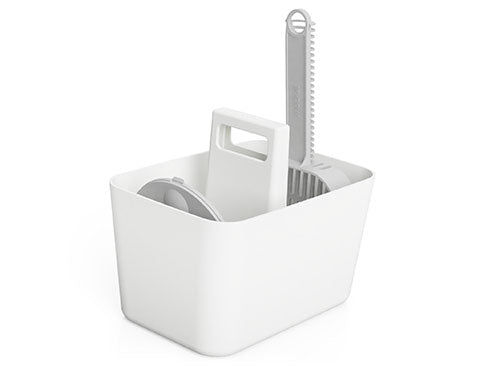
Tidy-Up Kit
Scoop holder & dustpan

Lounge + Play
Scratchers & toys
Refills
Add description, images, menus and links to your mega menu
A column with no settings can be used as a spacer
Link to your collections, sales and even external links
Add up to five columns
Add description, images, menus and links to your mega menu
A column with no settings can be used as a spacer
Link to your collections, sales and even external links
Add up to five columns
Why do cats meow at night? See these effective tips for minimizing nighttime meows.
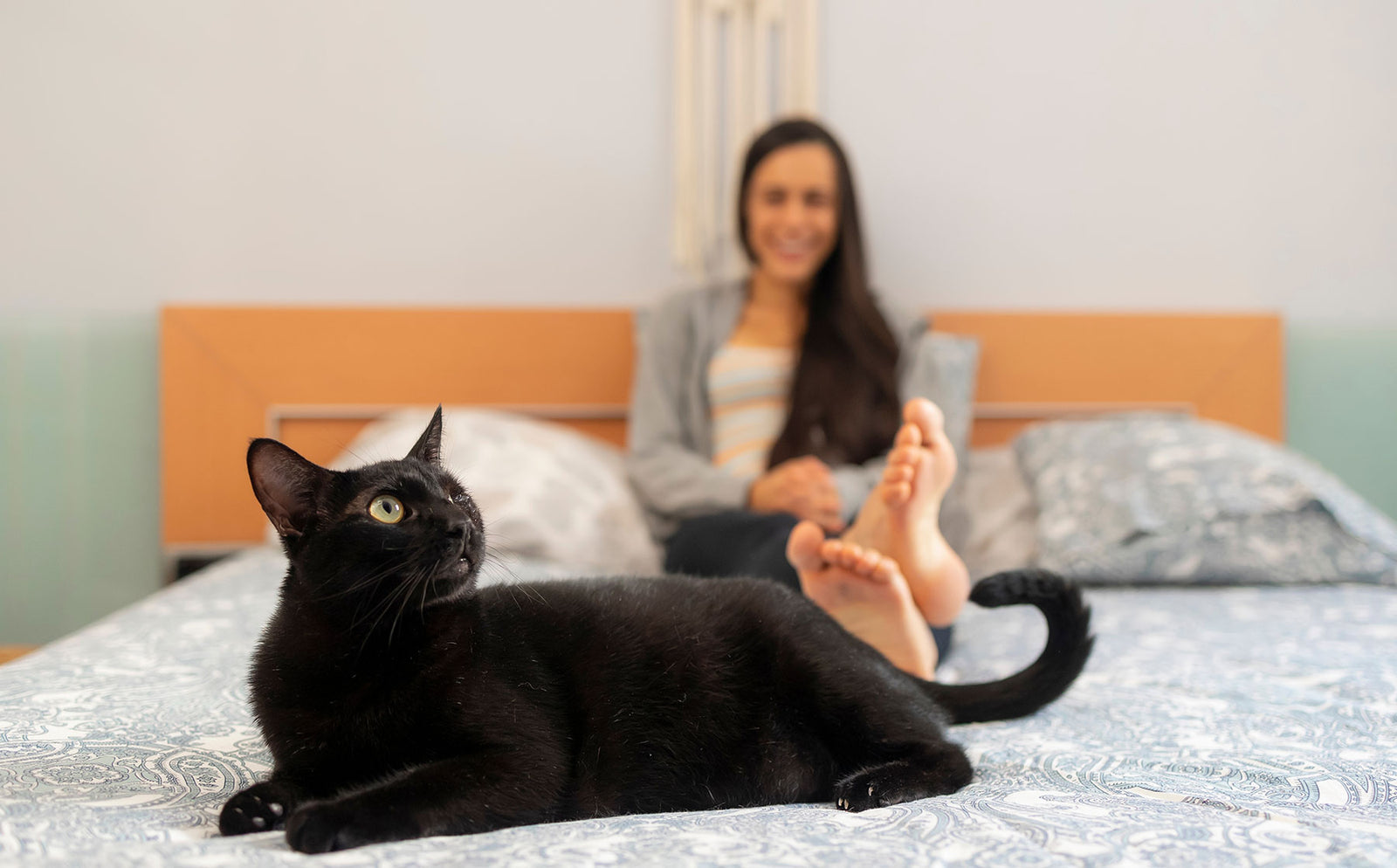
Is your cat's meowing keeping you up at night? You're not alone. Many cat lovers are being woken up by their vocal felines. A cat's nighttime meowing is their way of signaling a need such as hunger, thirst, or loneliness. Once you figure out why your cat fusses at night, you'll find it easier to calm them down.
Before trying any of our 6 tips, be sure to take your cat to the vet. Like us, cats can have excessive vocalization due to illness or pain. If you've ruled out health issues, though, consider some of these tactics to stop your cat from meowing all night. Let's first understand why your cat meows at night.
Why does your cat meow at night?
Cats meow at night for various reasons. Sometimes, they want a treat. Other times, your cat may need you to replenish their food or water. More often than not, they're meowing just because they're lonely and want to play, even when their people are fast asleep.
While these are fairly benign reasons for nighttime meowing, occasionally, cats meow because they're distressed, disabled, demented, or looking for a mate. Excessive meowing due to boredom is easy to solve. Get that cat some toys! Then be sure to play with them for 20-60 minutes a day. If you're certain your cat is getting enough attention and exercise, consider other reasons for meowing.
Cat behavior often reflects their health. Could your cat be feeling unwell? Hypertension, hyperthyroidism, and cystitis can all cause cats to meow due to distress or pain, and senior cats sometimes experience cognitive decline, similar to dementia in people. In this case, the cat may be confused or feel insecure at nighttime when the household is in bed.
On the younger end of things, a female cat in heat or an intact male cat may yowl at night because they are looking for a partner. Cats reach sexual maturity at around four months of age, so even a fairly young kitten may be seeking a mate at 2:30 in the morning when you're asleep. In this case, spaying or neutering your pet is a great solution - for more reasons than just stopping the meowing.
How do I teach my cat to stay quiet at night?
If your cat is super active at night, consider what the animal could be telling you:
- Is she bored? Try investing in a puzzle toy, a cat tree, or a scratcher.
- Is he sick? Consult your vet.
- Might the cat bed be uncomfortable, or is the litter tray in need of cleaning? These are easy to solve, too.
- Could she have dementia? Here again, the vet can help.
- Does your cat need to be neutered? Make the vet appointment today.
Consider another possibility: Your feline might be lonely. Cats can be more social than many pet owners realize. When you leave for work or when other people come over, it may make them feel alone and abandoned. These cats often make noise to get attention from their owners. It could be that your cat feels like he needs more love and attention at night. If your cat is crying during the night and you can't figure out the cause, consult your veterinarian for help. Your vet will take a look at your cat and rule out any physical causes before concluding that it's psychological. If your cat does experience mental health issues, your veterinarian may prescribe anti-anxiety medication as well as change the environment in order to keep your cat calm. Take a look at these other tips you can try to keep your pet from waking you in the early morning hours:
Reset your cat’s body clock.
Your cat might be meowing for attention, but he might also be meowing because he's got his days and nights completely flipped. If it's the latter, you can try resetting his body clock by getting him used to being awake during the day and sleeping at night. This will help him stop feeling anxious. Since cats are crepuscular — most active at dawn and dusk — they tend to get antsy if not stimulated at these times. Provide essentials like food and water.
One of the most common reasons for a cat's crying is that they are hungry or thirsty. Make sure to feed your cat plenty of good food and provide fresh drinking water every day. As kittens, our cats generally need feeding twice a day or more once they reach adulthood, though, once a day is usually enough. Be sure the food you provide offers high-quality nutrition for your pet. Some wet cat foods include a sugary, caramel substance to make the gravy look more appealing. Added sugar can cause your cat to gain weight, potentially leading to diabetes and other health problems. Healthy food can keep your cat feeling and behaving their best.
Scoop the litter box before bed.
Cats often meow at night because they need to do business and they can't. Cats are noted for their fastidiousness, and many pets simply won't use a litter box that smells like, well, a dirty litter box.
Scooping the box before bed can help your pet feel more comfortable and stop meowing. Be sure you also clean your box once a week with warm water and a sponge, and replenish the cat litter whenever it gets low. While a litter robot or a self-cleaning litter box might sound tempting, most cats find them distressing. And the fact is, you'll still have to scoop and clean them somehow. Sturdy covered litter boxes can reduce litter scatter, minimize odor, and make cleaning easy.
Give your kitty plenty of playtime and affection before bed.
Does your cat have an opportunity to play and feel enriched mentally and physically?
Most cats love to play. In the wild, cats hunt and hide to stay alive. As pets, our cats still enjoy peering out of boxes or leaping on unsuspecting wind-up mice. You can find hundreds of cat toys at your local pet retailer or on Amazon. What should you pick up for your pet?
Simple toys like lasers, wands, balls, and catnip-stuffed mice can entertain most cats. In addition to playtime, try to schedule a few minutes for affection and cuddles with the cats.
Use nightlights around your home to help senior cats with dementia or vision issues.
Senior cats often experience vision loss or cognitive decline.
Signs of vision loss include bumping into furniture, tripping on the stairs, or having trouble finding the food bowl or litter box. Feline dementia often shows up in a lack of grooming, forgetting learned behaviors, and…yes…excessive yowling.
The sound of your voice is often the most effective way to get your senior cat to stop meowing. Try walking through your house and speaking softly, calling their name, and telling them you'll be there in a minute.
It's also helpful to have nightlights around the house so that they can see deeper into the shadows and know they are safe. This will help with any cat that yowls because they have dementia or vision issues.
Refrain from responding to your cat's night-time meowing.
If your cat is meowing from disability, dementia, pain, or unrequited romance, a vet can help. But if your pet just wants attention while you're catching up on sleep, you might try ignoring the behavior. How do you know whether to address or avoid your cat's constant meowing?
First, see if your cat shows signs of pain such as hiding, lethargy, or limping. In this case, contact the vet. Investing in pet insurance can help meet the cost of higher-than-average vet bills.
If your pet doesn't appear to be in pain, acts normal during the day, and has plenty of toys to keep her entertained, your best investment might just be a pair of earplugs!
Bonus Tip: Check for lights or sounds that could disturb your pet.
Some cats are light sleepers. Any loud noise, maybe even an alarm clock, can set them to prowling around the grounds in search of a perceived intruder.
If you suspect a nightlight, streetlight, or small sound may be the culprit, see what you can do to address the problem. The solution might be as simple as turning off the lights or investing in a white noise machine for the room where your pet sleeps.
Most often, however, cats meow due to medical or behavioral issues. If your vet doesn't spot any problems, consider that your cat might need a little more attention or some new playthings to occupy her mind during the day. Of course, you always want to check the food bowl, water dish, and litter box. A hungry cat is a loud cat! And make sure to keep the litter area fresh and clean for a happy, healthy pet.
Shop the Modkat litter boxes and accessories to freshen up your cat litter area today!
“It looks nicer than any other hooded or open option we considered.”

Categories
Meow from Brooklyn.
Sign up and get early access to product drops, exclusive offers, and the occasional cat meme.
Similar products related to this blog:
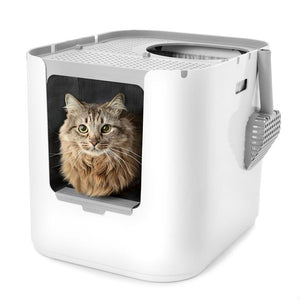
"It looks nicer than any other hooded or open option we considered."

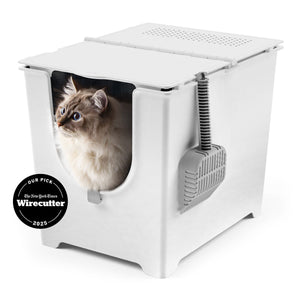
"This litter box keeps everything in, nothing gets out the sides."
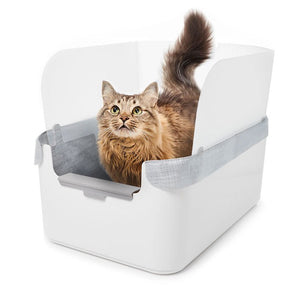
"My beautiful ragdoll cat and I both love the new Modkat Litter tray!"

